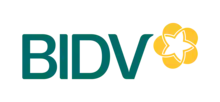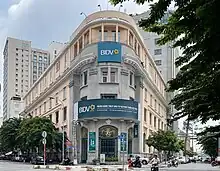 | |
| Type | State-owned |
|---|---|
| Industry | Banking, Finance, Security |
| Founded | 26 April 1957 |
| Headquarters | Hoan Kiem, Hanoi, Vietnam |
Key people | Lê Ngọc Lâm, CEO Phan Đức Tú Chairman |
| Products | Transaction accounts Insurance stock brokerage Investment bank Asset-based lending Consumer finance Trade International payments Foreign exchange |
| Total assets | |
Number of employees | 23,200 full time equivalent[3] |
| Website | www |

The Joint Stock Commercial Bank for Investment and Development of Vietnam (Vietnamese: Ngân hàng Thương mại Cổ phần Đầu tư và Phát triển Việt Nam), commonly known as BIDV, is a Vietnamese state-owned bank in Vietnam. It is the country's biggest bank by assets ($72 billion USD) as of June 2021.[2] According to the United Nations Development Programme report on the 100 largest enterprises in Vietnam, BIDV came in at the 4th position after Agribank, VNPT, and EVN.[4]
BIDV received Asia Risk Magazine's House of the Year Award for being at the forefront of the country's economic development by modernising its risk management and developing new financial products such as energy derivatives hedges.[5]
History
BIDV was established on 26 April 1957 as the Bank for Construction of Vietnam (Ngân hàng Kiến thiết Việt Nam), under which name it operated until 24 June 1981, at which point it changed its name to the Bank for Investment and Construction of Vietnam (Ngân hàng Đầu tư và Xây dựng Việt Nam). It adopted its present name on 14 November 1990.[3][6]
In January 2007, the Vietnamese government announced that it would sell a minority stake in the BIDV and three other banks.[7] In March of that same year, they sought the government's permission to invest in highway projects.[8] In September, they announced that they would form Vietnam's first aircraft finance group in Hanoi in a joint venture with Vietnam Airlines, PetroVietnam, and Vietnam Post and Telecommunication.[9]
In November 2019 BIDV officially signed a strategic cooperation agreement with Hana Bank and announced the Korean bank as its foreign strategic shareholder who owns 15% of its charter capital. This is the biggest M&A deal with a strategic investor in Vietnam's banking industry[10]
See also
References
- ↑ https://www.bidv.com.vn/en/quan-he-nha-dau-tu/bao-cao-va-tai-lieu/bao-cao-thuong-nien
- 1 2 https://www.bidv.com.vn/bidv/tin-tuc/thong-tin-bao-chi/6-thang-dau-nam-bidv-duy-tri-hoat-dong-on-dinh-an-toan
- 1 2 "INTRODUCTION OF BANK FOR INVESTMENT AND DEVELOPMENT OF VIETNAM". Bank for Investment and Development of Vietnam. Archived from the original on 9 January 2008. Retrieved 17 January 2008.
- ↑ "Viet Nam's Top 200 businesses list announced". Ministry of Foreign Affairs, Vietnam. 2 October 2007. Archived from the original on 28 February 2008. Retrieved 19 January 2008.
- ↑ "House of the Year, Vietnam – BIDV". Asia Risk. 18 October 2012. Retrieved 27 November 2012.
- ↑ "GIỚI THIỆU VỀ NGÂN HÀNG ĐẦU TƯ VÀ PHÁT TRIỂN VIỆT NAM" (in Vietnamese). Bank for Investment and Development of Vietnam. Archived from the original on 12 January 2008. Retrieved 17 January 2008.
- ↑ Folkmanis, Jason (7 January 2007). "Vietnam to sell stakes in 4 banks". International Herald Tribune. Archived from the original on 17 February 2008. Retrieved 17 January 2008.
- ↑ "BIDV wants to invest in highway projects". Vietnamnet Bridge. Vietnam News Agency. 2 March 2007. Archived from the original on 2 February 2008. Retrieved 17 January 2008.
- ↑ Nguyen, Pham (14 September 2007). "Vietnam's state-owned BIDV to form country's first aircraft leasing firm". MarketWatch. Dow Jones. Retrieved 17 January 2008.
- ↑ https://www.bidv.com.vn/bidv_en/tin-tuc/thong-tin-bao-chi/keb-hana-bank-tro-thanh-co-dong-chien-luoc-nuoc-ngoai-bidv